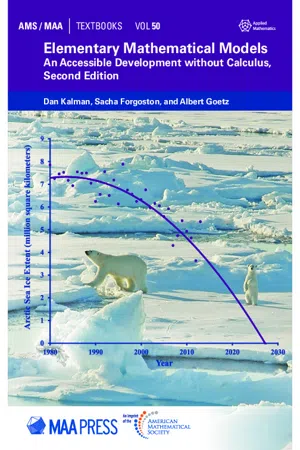
Elementary Mathematical Models
An Accessible Development without Calculus, Second Edition
- English
- PDF
- Available on iOS & Android
Elementary Mathematical Models
An Accessible Development without Calculus, Second Edition
About this book
Elementary Mathematical Models offers instructors an alternative to standard college algebra, quantitative literacy, and liberal arts mathematics courses. Presuming only a background of exposure to high school algebra, the text introduces students to the methodology of mathematical modeling, which plays a role in nearly all real applications of mathematics. A course based on this text would have as its primary goal preparing students to be competent consumers of mathematical modeling in their future studies. Such a course would also provide students with an understanding of the modeling process and a facility with much of the standard, non-trigonometric, content of college algebra and precalculus.This book builds, successively, a series of growth models defined in terms of simple recursive patterns of change corresponding to arithmetic, quadratic, geometric, and logistic growth. Students discover and come to understand linear, polynomial, exponential, and logarithmic functions in the context of analyzing these models of intrinsically—and scientifically—interesting phenomena including polar ice extent, antibiotic resistance, and viral internet videos. Students gain a deep appreciation for the power and limitations of mathematical modeling in the physical, life, and social sciences as questions of modeling methodology are carefully and constantly addressed. Realistic examples are used consistently throughout the text, and every topic is illustrated with models that are constructed from and compared to real data.The text is extremely attractive and the exposition is extraordinarily clear. The lead author of this text is the recipient of nine MAA awards for expository writing including the Ford, Evans, Pólya, and Allendoerfer awards and the Beckenbach Book prize. Great care has been taken by accomplished expositors to make the book readable by students. Those students will also benefit from more than 1,000 carefully crafted exercises.
Tools to learn more effectively

Saving Books

Keyword Search

Annotating Text

Listen to it instead
Information
Table of contents
- Cover
- Title page
- Copyright
- Contents
- Preface to Second Edition
- Note for Students
- Chapter 1. Sequences and Number Patterns
- Chapter 2. Arithmetic Growth Models
- Chapter 3. Quadratic Growth
- Chapter 4. Geometric Growth
- Chapter 5. Mixed Growth Models
- Chapter 6. Logistic Growth
- Selected Answers to Exercises
- Bibliography
- Index
- Back Cover
Frequently asked questions
- Essential is ideal for learners and professionals who enjoy exploring a wide range of subjects. Access the Essential Library with 800,000+ trusted titles and best-sellers across business, personal growth, and the humanities. Includes unlimited reading time and Standard Read Aloud voice.
- Complete: Perfect for advanced learners and researchers needing full, unrestricted access. Unlock 1.4M+ books across hundreds of subjects, including academic and specialized titles. The Complete Plan also includes advanced features like Premium Read Aloud and Research Assistant.
Please note we cannot support devices running on iOS 13 and Android 7 or earlier. Learn more about using the app